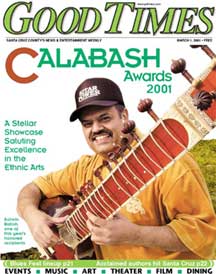
The gala event, launched last year by the Santa Cruz Ethnic Arts Network (SCEAN), Ethnofête and the Cultural Council of Santa Cruz, is more than just an awards show. It’s a deluxe showcase that features the honorees doing what they do best. And Batish, originally from Bombay, India can probably do that with his eyes closed.
In fact, Good Times recently found Batish in just such a relaxed state in his recording studio on Mission Street. Sitting legs crossed, his eyelids serene, Batish, holding the four-and-a-half-foot-long sitar he bought for a mere $20 back in the ’70s, tossed his head back and with a wide, glistening smile, strummed away and suddenly, the atmosphere of the room changed.
With a chuckle, Batish mused, “I can be at the Taj Mahal without even going there.”
Such is the magic of the sitar, a long-necked, gourd-shaped Indian lute with movable frets that allows Batish to become a musical magician. With a pull or a pluck of a string, he creates a mood that is often soulful, if not ancient and ethereal, and many times downright playful.
“The music does tend to tickle and scratch some part of the psyche,” he said.
Batish spent his adolescent years in London, where his father, Pandit Shiv Dayal, taught Indian music. (In India., Batish’s father was a household name.) Batish began playing classical Indian music on the sitar when he was 12, and when he moved to Santa Cruz in 1973 (his father taught Indian music at UC Santa Cruz), his family opened Batish India House, a popular restaurant that enjoyed a 15-year lifespan.
It was in the restaurant that he began to refine his sitar playing.
“My father and I would just play and play and play music for the people,” he said. “We loved it.”
As Batish’s knowledge grew, he went on to teach Indian music at San Jose State University and, eventually, in the recording studio he opened on Mission Street. Over the years, his love for the work landed him gigs all over town, and he became known as an eclectic performer able to meld old-world sounds with modern trends.
In 1981, he released The Third Stream, but it was Sitar Power, released on his own label in 1986, that really took off. It offered a clever mix of rock fused with Indian music, which, Batish said, “was my own answer to breaking loose a little from my own tradition.”
When his song “Bombay Boogie” caught the attention of the record industry, Batish suddenly found himself a NAIRD (National Association of Independent Record Distributors) winner. He continued performing, touring at music festivals internationally and domestically. Sitar Power II, released in 1994, had just as much verve. It blended North Indian classical music with samba, jazz, R&B, country and surf and garnered a bevy of raves. The Village Voice called Batish a “supple improviser, and thank God he wears a silly grin, no shaman has a dour expression.”
Local concert promoter David Claytor took part in the Calabash Awards’ nomination process, and remembers when Batish’s music caught his attention back in the ’80s.
“Ashwin really was the first to pioneer a fusion of world music, with the more pop-sounding influences that were out there,” Claytor said. “He boogied in ways that nobody thought of before. I see him as an innovator and a world-class musician. He’s been an institution on Mission Street for years and he’s definitely brought some culture here.”
Elevating ethnic diversity is the main criteria for being nominated for a Calabash Award. Contribution to the community is the other.
“I am always honored to get recognition of any kind,” said Batish. “I think to recognize artists will do good for this town. But it’s not the end, or the beginning, it’s just part of what you are doing. It’s a pat on your back and it’s like saying, ‘OK, thanks.’ But I have long way to go still — I have a huge journey ahead.”
Batish says this adventure will include producing a great deal of his father’s music. He also wants to carry Indian music forward to the “psyches” of the people.
“It’s still a niche market here,” he added. “It is still only played on NPR or college radio. But we are very fortunate for any award like this because they are recognizing the music. To me, there are so few people who play this music, so if Indian music can be brought forward, I do believe it has the elements to make it survive for a thousand years ahead.”
Visit our home pages at
Batish.com | RagaNet.com | Ashwin Batish